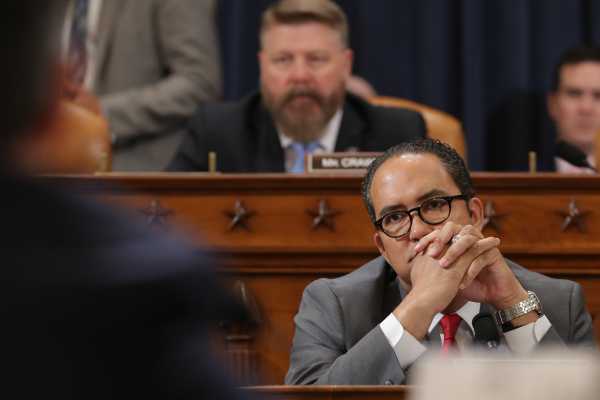
The official campaign arm of House Democrats has declared a “TEXODUS”: a mass exodus of Texas Republicans from the House.
This week, Rep. Will Hurd (R-TX), the House’s only black Republican who represents a border district, made a shocking announcement.
“After reflecting on how best to help our country address these challenges, I have made the decision to not seek reelection,” he wrote in a statement. “As the only African American Republican in the House of Representatives and as a Congressman who represents a 71 percent Latino district, I’ve taken a conservative message to places that don’t often hear it,” he added.
It’s a major blow to House Republicans; Hurd was seen as the only Republican who could hold on to the district, which spans from El Paso to San Antonio, Texas — a district that voted for Hillary Clinton in 2016. That said, it’s not that surprising he wants to step down; he barely made it through the 2018 midterm elections, beating Democrat Gina Ortiz Jones by less than 1,000 votes. Ortiz Jones is running again, and has been out-fundraising Hurd.
Hurd, at age 41, became the eighth House Republican to announce his retirement so far. Three of those retirements have come out of Texas: Reps. Mike Conaway, and Pete Olson said they’d be bowing out of the 2020 election cycle. Olson’s district is also competitive. It’s not just Texas; Rep. Susan Brooks (R-IN) is also leaving a competitive seat in Indiana.
Trump has put the ordinary story of congressional retirements into a new light
Every election cycle comes with its fair share of retirements, but the presence of President Donald Trump suggests something here is different. The 2018 midterms brought a near-record number of Republican retirements. There are several explanations for this, as I explained last year.
For one, being a member of Congress isn’t what it used to be. Congressional leadership has increasingly centralized decision-making away from individual lawmakers, and that’s even worse for House Republicans, who are in the minority. To put it bluntly, the job can really suck.
Then there is Trump. The 2018 midterms showed that Trump has made it too difficult for more Republicans to run in more moderate districts, like Hurd’s. Just ask Mike Coffman, the Colorado Republican who tried to hold on to his seat in suburban Denver in 2018: “Donald Trump is about Donald Trump, and what Donald Trump is, is he wants to be the center of attention every single day,” Coffman told me after his loss. “He wants to dominate the news cycle every single day, and good luck trying to get a message out of that.”
Hurd and Brooks, notably, were two of the four Republicans that voted to condemn Trump’s racist comments telling the four Democratic women of color to go “back” to where they came from.
House Democrats have a 38-seat majority in the House, which they will be looking to expand in 2020. But Democrats have been struggling to get their operation in order.
A major shakeup went down at the Democratic Congressional Campaign Committee (DCCC) this week, after Hispanic and African American lawmakers raised concerned about diversity in the organization. The DCCC executive director resigned this week, as did several ranking staff members. Meanwhile, progressives have grown frustrated with the DCCC chair, Rep. Cheri Bustos (D-IL), for the organization’s handicapping of Democratic candidates challenging incumbents in the party.
A group affiliated with first-term Democratic star Alexandria Ocasio-Cortez, Justice Democrats, has made primary challenges for Democrats a priority — hoping to move the party as a whole to the left.
But on the whole, Hurd’s announcement is a clear win for Democrats, who have a path to victory in a Hispanic-heavy district that is not really interested in what Trump’s Republican Party has to offer.
Sourse: vox.com






